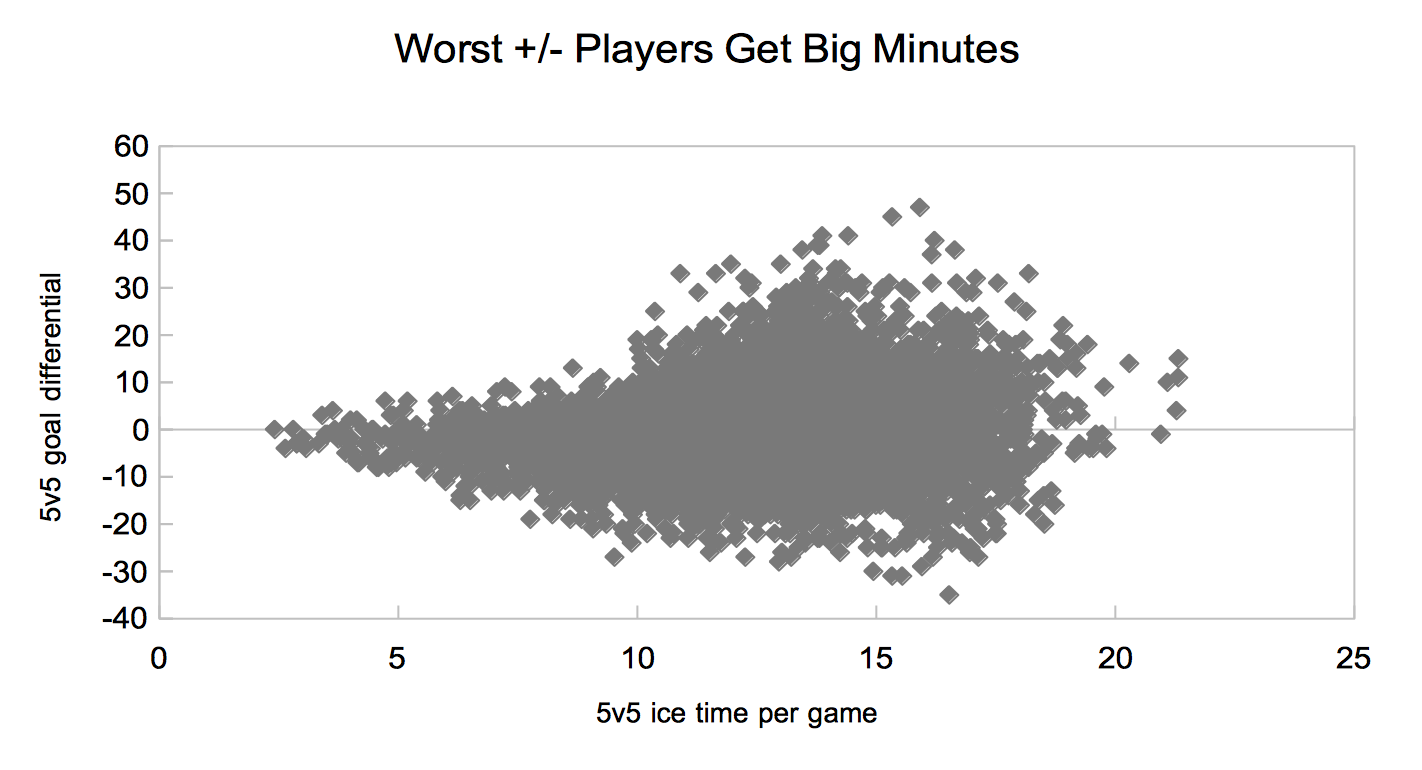I have to begin by admitting that when Mitch Marner was announced as a Selke Finalist, I burst out laughing. Not as loud as for Erik Karlsson, Norris Trophy candidate, but nearly. After I'd stopped, I considered the situation and thought, okay, this is a good opportunity to unpack what defence actually is, particularly when practiced by forwards. I'll leave whatever it is Karlsson does to others to examine.
The Frank J. Selke Trophy is an annual award given "to the forward who best excels in the defensive aspects of the game." The winner is selected in a poll of the Professional Hockey Writers' Association at the end of the regular season.
Traditional views of defence require tall, strong, square-jawed men who defend the crease, push opposing players to the outside, block shots, wave their long flex-free sticks around on the PK and generally spend their time finishing checks when the rest of the team is trying to transition to offence. Marner is clearly none of those things. And yet a great many people think Marner has excellent defensive abilities. I think a certain amount of that is that it's a slogan that gets repeated, and when questioned as to what that means, you'd get a range of answers often involving plus/minus or its gentrified version GF%. Sometimes you do get deeper analysis of his play in the offensive zone that hits the mark.
I'll start with the plus/minus, though. Why not? I have no respect for the NHL awards and the criteria used to vote on them or select them. I don't think most people voting are doing much more than going on the reputation of players they've barely seen play in most cases. NHL.com stats are what they look at. This is all moot this year, because the other choices are Patrice Bergeron and Nico Hischier and I'll bet you 11 million imaginary dollars that Bergeron gets it as a lifetime achievement award for Selke-friendly play. But nonetheless, here's my annual foray into junk stats.

Plus/minus says Joe Pavelski should win this, but everyone knows he's a "scoring forward who hits" so he can't have it. You need points, but you also need minutes on the PK and a reputation for defending.
Amongst forwards, Bergeron is fourth in this hideous metric, Hischier is sixth, and Toronto is represented by some plug named Auston Matthews at seventh. He doesn't PK though, the loser. Marner is 31st, behind Michael Bunting, which actually raises the question of how he got on this list ahead of some other candidates. A cynic might say fame.
Let's gentrify this and look at GF% at five-on-five. I call this gentrified plus/minus because while it removes some of the horribleness of that other weird metric, it still assumes direct responsibility by the player for the on-ice outcomes around him and ignores randomness.
To use a percentage stat, you have to add a filter for minutes or games played or something, which is why plus/minus is so beloved by the sort of person who says filter? in a confused tone. Anyway, using 300 minutes of TOI, Bergeron is tops, (Nick Foligno, the loser Kyle traded for when he was scared and wanted a tough guy, is fourth), Matthews is ninth (he should likely take $10 million and say thank you for it now that he can't score) and Marner is 27th. Bergeron drops to fourth in all-situations and Marner to 75th. Hischier doesn't show up here at all in good locations, so I guess he is the plus/minus guy on the finalist list.
The PK is next – forwards with at least 50 minutes shorthanded were considered here. Nico Hischier is higher than the other two by GF%, so this is his other calling card. Marner and Bergeron are, frankly, terrible by this rating.
Okay that was all very silly. GF% on the PK is as much goaltending and happenstance as the players' skill, and none of this nonsense measures defence. What does?
To begin at the end result, a look at Expected Goals Against gives a good comparison across players for who is on the ice for the least chance of opposition scoring.
The top three this season play for Carolina when you filter this and use the per 60 version. Golly, is this also a team-influenced number? You'd almost think so. (Nick Foligno, that scrub again, is ninth.) Bergeron is 13th. Toronto's best regular roster player is Alex Kerfoot, naturally. Gosh, let him walk, eh? Of the three Selke finalists, Marner is worst at 2.48 xGA/60. Hischier is next at 2.35 and Bergeron is at 2.07. Marner is 146th in this group of forwards.
Okay, enough of that nonsense, which allowed us to discover that Boston and Carolina were good defensively in case we'd missed that. The concept of the Selke is for a famous top-line forward who plays a lot of PK (quality irrelevant) and who has a reputation of being defensibly reliable. So while we have to ignore those guys who don't score like Kerfoot, what is Marner doing here?
On the Leafs, of the top six regulars, he has the best xGA/60. There is some rationality to his reputation. And when you apply a model that accounts for teammates, competition and all those other things, you get a very similar ranking within the Leafs with Marner near the top – it's not coattail riding, in other words.
But come the F on. Really. Pull the other one.

Enough of that nonsense too. The really interesting thing is to actually watch Marner play (shocking, I know) and discover what he does that leads to those very good outcomes above. Because to be clear, Marner has some good positive outcomes on both shots and quality of shots against. Not Bergeron-esque, but better than Hischier. And we know full well what he is not doing, so what is he doing?
An article this year very derisively (and inaccurately) claimed the Leafs defend by spending all their time in the offensive zone (that's Carolina) and that's bad because they have no defending the crease skills. They have some, better than they've ever been in recent memory, but they aren't built around that single skill, it's true.
There isn't actually anything wrong with cutting down the chance the other team scores by not letting them have the puck, though. That's actually a good thing! And it's where Marner "defends" extremely well. He takes the puck away in all zones, but he is particularly good at maintaining possession in the offensive zone. Make no mistake, the majority of his reputation as a defensive player is that his lines don't get hemmed in, and that's at least in part his skills at stripping the puck, moving it effectively, transitioning to offence or maintaining possession. His bigger impact is on the volume of shots allowed, and he has excellent impacts on overall shotshare, his defence in the defensive zone is not a big deal by these numbers. It's real, but not Selke-time impressive.
I went to Natural Stat Trick to get the most de-junkified reading on takeaways it's possible to get. These ancillary stats are not as meaningful as the other things the official scorers mark down, and they are more likely to be unreliable. Using only "away" stats helps a little. So I did that and looked at takeaways per 60 minutes for players with over 300 minutes in TOI. First is Mark Stone, and he's be all over this award if he'd played more regular season games. He's a beast at everything Selke when he's healthy. Mitch Marner is eighth. And this is per 60 minutes (anyone who quotes me a Marner stat without rating it gets ignored because, he plays so many minutes, you've got to factor in ice time or you're lying whether you mean to or not). Marner is a beast at this particular skill, though.
Not losing the puck near one of the blue lines or getting it back if you do is worth a lot in the NHL. But don't go looking up giveaways or you might start to ask some questions. Ones like: Is this stat just a measure of who handles the puck a lot? Is that why Morgan Rielly and Mitch Marner seem identical at it and yet no one thinks Rielly is a good defenceman?
Marner's puck skills are a form of defending that is non-traditional and extremely hard to measure in any way beyond the results of modern shot-based modelling, and for that reason it's interesting he got this nomination. I still think the choices are hilariously wrong on two counts, but Bergeron – now I've looked over the nonsense and less nonsensical numbers – should win it on merit out of the three.
Marner's impact on defence – on limiting goals against – is real and better than a lot of wingers manage, but for my money, Alex Kerfoot is the best defensive forward the Leafs have had over the last few years.




Comment Markdown
Inline Styles
Bold: **Text**
Italics: *Text*
Both: ***Text***
Strikethrough: ~~Text~~
Code: `Text` used as sarcasm font at PPP
Spoiler: !!Text!!